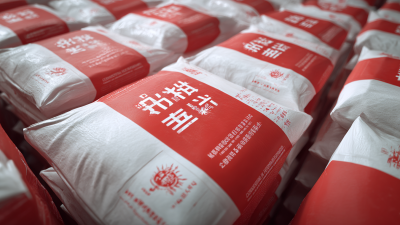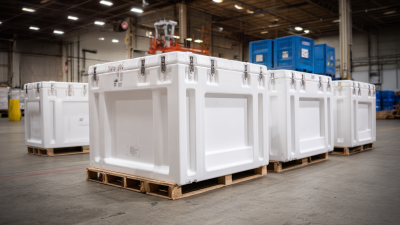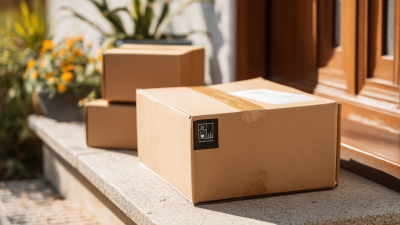7 Essential Tips for Choosing the Best Insulated Shipping Boxes for Your Business
In the rapidly evolving world of e-commerce, ensuring the integrity of temperature-sensitive goods during transit is more crucial than ever. With the global insulated shipping market expected to surpass $2 billion by 2025, businesses must prioritize the selection of the right Insulated Shipping Boxes. According to a recent report by the Cold Chain Alliance, approximately 30% of perishable goods spoil during transportation, highlighting the need for effective insulation solutions. This emphasizes the importance of choosing high-quality insulated boxes that not only protect products from temperature fluctuations but also comply with industry standards. By understanding the various factors influencing this choice, businesses can significantly reduce spoilage rates and enhance customer satisfaction. In this blog, we will explore seven essential tips for selecting the best insulated shipping boxes tailored to your specific needs, ensuring your products arrive in optimal condition every time.

Key Factors to Consider When Selecting Insulated Shipping Boxes
When selecting insulated shipping boxes, advancements in temperature-control technologies are becoming increasingly vital. These innovations are transforming the logistics of temperature-sensitive products, ensuring that items such as perishable foods remain fresh during transit. The integration of advanced materials and designs that enhance insulation effectiveness is essential for any business relying on these shipping methods. By focusing on these modern solutions, businesses can significantly reduce spoilage and waste, ultimately leading to higher customer satisfaction.
In addition to temperature-control technologies, businesses should also consider the box's size and durability. Selecting the right size is crucial to minimize movement within the box, which can compromise insulation efficiency. Moreover, durable materials can withstand the rigors of transportation, protecting the contents from physical damage. Together, these factors contribute to an optimized shipping solution that not only preserves the quality of the product but also enhances the overall shipping experience for both the business and the customer.
7 Essential Tips for Choosing the Best Insulated Shipping Boxes for Your Business
| Factor | Description | Importance |
|---|---|---|
| Material | Choose durable materials that provide adequate insulation and protection. | High |
| Size | Select sizes that fit your products snugly to minimize movement. | Medium |
| Temperature Control | Ensure the box maintains required temperatures for perishable items. | High |
| Weight | Consider the weight of the box to avoid excessive shipping costs. | Medium |
| Environmental Impact | Opt for eco-friendly materials that minimize environmental harm. | High |
| Cost | Balance quality and price to ensure profitability of shipping. | High |
| Customization | Look for options to customize to reflect your brand identity. | Medium |
Understanding Different Types of Insulated Shipping Materials
Insulated shipping boxes are crucial for ensuring that temperature-sensitive products, especially food items, arrive in optimal condition. With the recent advancements in packaging materials, businesses now have access to a variety of insulated shipping materials tailored for sustainability and effectiveness. The exploration of biodegradable and bio-based options is particularly noteworthy; for instance, studies have shown that biopolymers can significantly mitigate the risks associated with traditional non-biodegradable materials, enhancing food safety while promoting eco-friendliness.
When choosing the right insulated shipping materials, consider integrating recycled content like rPET or natural fibers such as hemp and sheep's wool. These sustainable options not only provide effective thermal insulation but also minimize environmental impact. Furthermore, materials like chitosan nanocomposites are emerging as innovative solutions, offering antimicrobial properties that are essential for food packaging. This can reduce spoilage and extend shelf life — critical for maintaining product quality during transit.
Tip 1: Assess the insulation performance by looking at materials' thermal conductivity ratings, which can guide you in selecting the most effective options for your needs.
Tip 2: Evaluate the environmental certifications of the materials, as this reflects their sustainability and potential market appeal. By prioritizing eco-friendly options, businesses can align with consumer preferences for responsible packaging solutions.

How Temperature Control Affects Your Shipping Needs
When it comes to shipping goods that require temperature control, the choices you make regarding insulated shipping boxes are vital. The demand for reliable, temperature-controlled logistics is surging, especially as global trade expands and the need for specialized shipping solutions rises. Businesses must consider how temperature fluctuations can affect the integrity of their products during transit. Using the right insulated shipping boxes not only safeguards perishable items but can also enhance customer satisfaction by ensuring timely deliveries.
As we approach peak shipping seasons, like the surge leading up to Mother's Day, the importance of efficient cold chain logistics becomes increasingly evident. By investing in high-quality insulated boxes, businesses can mitigate the risks associated with temperature-sensitive shipments. Furthermore, innovations in air cargo cold chain logistics are setting new standards for speed and accuracy in temperature-controlled deliveries, emphasizing the necessity of staying ahead in this competitive landscape. Adapting to these trends and prioritizing insulated shipping solutions can make a significant difference in maintaining product quality and reliability in a rapidly evolving market.
Cost vs. Quality: Finding the Right Balance in Insulated Box Selection
When selecting insulated shipping boxes for your business, it's crucial to strike the right balance between cost and quality. A study by the Packaging Association indicates that 77% of companies prioritize quality assurance in packaging to minimize product loss during transit.
Investing in high-quality insulated boxes can help maintain temperature-sensitive goods, ensuring they arrive in optimal condition, which can significantly reduce costly returns and enhance customer satisfaction.
However, it's essential to assess the cost implications of your choices. According to the 2022 Packaging Trends Report, 68% of businesses reported an increasing budget for sustainable packaging solutions, indicating a growing trend toward investing in eco-friendly materials. While these options might come with a higher upfront cost, they often provide long-term savings through increased efficiency and reduced waste.
By evaluating both the performance and the price of insulated shipping boxes, businesses can ensure they are making informed decisions that align with their financial and operational goals.

Environmental Impact: Choosing Eco-Friendly Insulated Packaging Options
When it comes to insulated shipping boxes, the environmental impact of your packaging choices cannot be overlooked. In an age where sustainability is paramount, businesses must prioritize eco-friendly options that effectively protect their products while minimizing their carbon footprint. Opting for boxes made from recycled materials or biodegradable substances can significantly reduce waste and promote a more sustainable supply chain. Not only does this benefit the planet, but it also appeals to a growing segment of consumers who prefer to support eco-conscious brands.
Furthermore, it’s essential to consider the insulation materials used within these boxes. Traditional foams and plastics can take centuries to decompose, posing a risk to the environment. Instead, explore options like plant-based insulation or recycled paper alternatives, which offer excellent thermal protection while being much kinder to the Earth. By selecting sustainable materials for your insulated shipping boxes, your business can contribute to a healthier planet and showcase its commitment to responsible practices—a factor that can enhance brand loyalty and attract environmentally-minded customers. As you navigate your packaging choices, remember that eco-friendly options not only align with global sustainability goals but also set your business apart in a competitive market.
Environmental Impact of Insulated Shipping Boxes
Related Posts
-

Unlocking the Advantages of Insulated Shipping for Global Buyers
-

Elevate Your Supply Chain with Premium Cornstarch Packaging from China
-

How to Choose the Best Shipping Coolers for Optimal Temperature Control and Cost Efficiency
-

Issues with Traditional Insulated Shipping Solutions Compared to Foam Shipping Coolers
-

Mastering the Art of Packing with Styrofoam Shipping Boxes: A Step-by-Step Tutorial for Optimal Protection
-

Solutions for Efficient Shipping: Why Best Insulated Mailing Boxes are Essential for Global Sourcing






